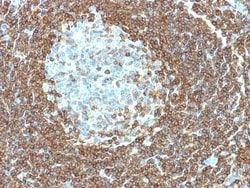HLA A Antibody (CATA-1) - Azide and BSA Free, Novus Biologicals™
Mouse Monoclonal Antibody
Manufacturer: Fischer Scientific
The price for this product is unavailable. Please request a quote
Antigen
HLA A
Concentration
1.0 mg/mL
Applications
Flow Cytometry, Immunohistochemistry (Paraffin), Immunofluorescence, CyTOF
Conjugate
Unconjugated
Host Species
Mouse
Research Discipline
Adaptive Immunity, Cell Biology, Immunology
Formulation
PBS with No Preservative
Gene ID (Entrez)
3105
Isotype
IgG2a κ
Purification Method
Protein A or G purified
Test Specificity
This MAb reacts with cells bearing HLA-A25 or HLA-Aw32 antigens. In addition, a reaction was observed with a cell of phenotype A2, Aw31; B17, Bw49. HLA-A, with HLA-B and HLA-C, belongs to major histocompatibility complex (MHC) class I antigens and expresses constitutively on all nucleated cells. HLA system comprises closely linked genes controlling highly polymorphic proteins involved in the presentation of peptides to the T-cell receptor, inhibition of NK cell cytotoxicity, and rejection of tissue allotransplantation. Specific alleles at HLA loci are associated with diseases. This MAb is specifically applicable for typing peripheral T cells for the antigens HLA-A25 and HLA-Aw32.
Clone
CATA-1
Dilution
Flow Cytometry : 0.5 - 1 ug/million cells in 0.1 ml, Immunohistochemistry-Paraffin : 0.5 - 1.0 ug/ml, Immunofluorescence : 0.5 - 1.0 ug/ml, CyTOF-ready
Classification
Monoclonal
Form
Purified
Regulatory Status
RUO
Target Species
Human
Gene Alias
A-10 alpha chain, FLJ26655, HLA class I histocompatibility antigen, A-1 alpha chain, HLA class I histocompatibility antigen, A-28 alpha chain, HLA class I histocompatibility antigen, A-9 alpha chain, HLAA, major histocompatibility complex, class I, A, MHC class I antigen A*1, MHC class I antigen A*11, MHC class I antigen A*80
Immunogen
Normal human peripheral blood lymphocytes of phenotype A1, Aw32, B7, B37, Cw-, Cw-, DR2, DRw10
Primary or Secondary
Primary
Content And Storage
Store at 4C short term. Aliquot and store at -20C long term. Avoid freeze-thaw cycles.
Molecular Weight of Antigen
41 kDa
Description
- HLA A Monoclonal specifically detects HLA A in Human samples
- It is validated for Flow Cytometry, Immunohistochemistry, Immunocytochemistry/Immunofluorescence, Immunohistochemistry-Paraffin, Immunofluorescence, CyTOF-ready.

